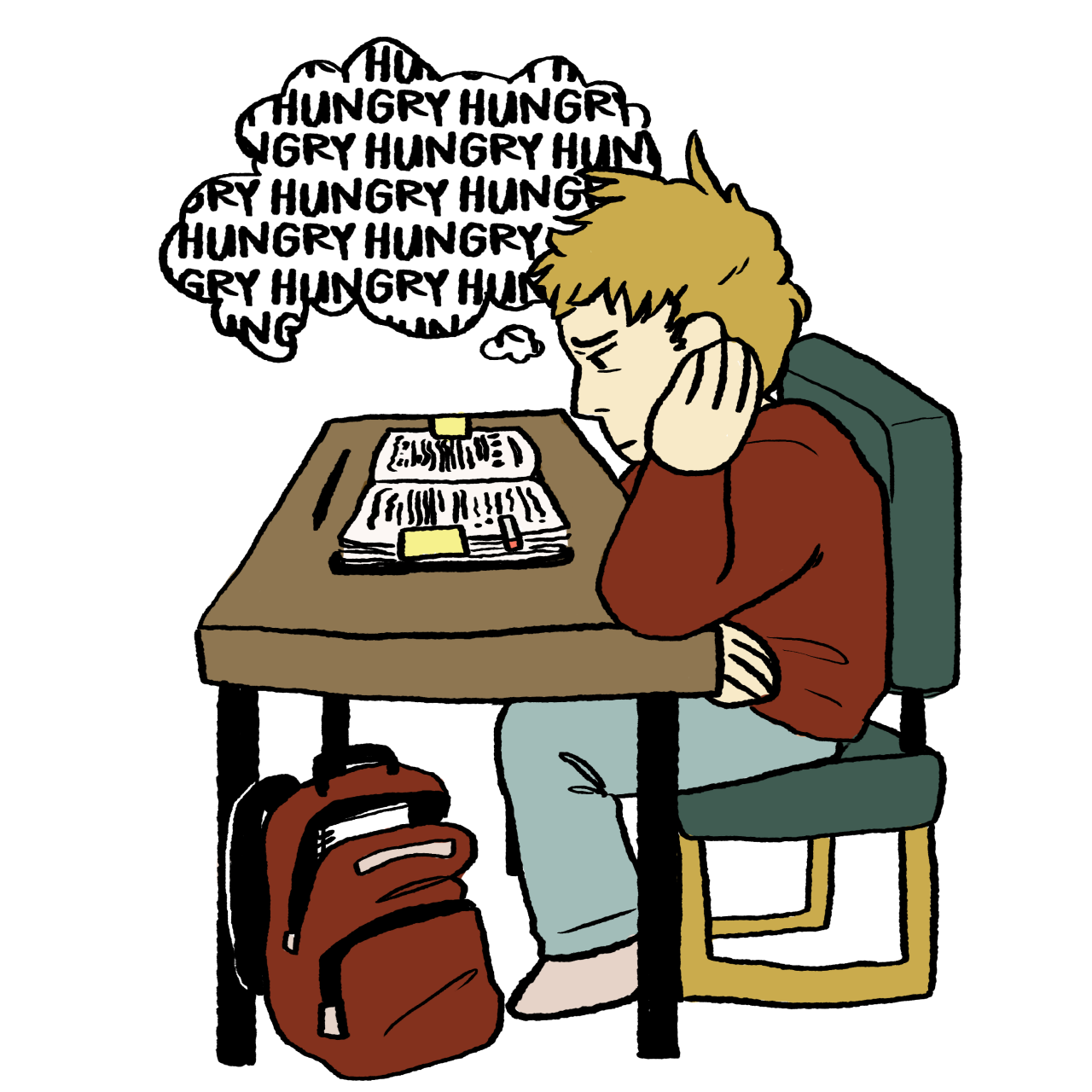Illustration by Ren Rader
Up to half of college and university students in the nation struggle with food insecurity, the lack of reliable access to sufficient quantities of affordable, nutritious food. In 2017, Morehouse College and Spelman College students undertook a hunger strike in solidarity with students experiencing food insecurity on their campuses. These students protested their respected institutions, pushing for them to allow students to donate unused meal plan vouchers to those on campus who needed them.
A situation like this is not unknown to Trinity. From 2016 to 2017, past undergraduate students and professors started a Food Insecurity Lab on campus seeking to research the role of marginalized and low-income status in San Antonio residents with food insecurity. According to models provided by the San Antonio Food Bank, Texas is currently No. 2 in the nation for food insecurity, with 1 in 6 individuals living in food insecure homes. Within the population they serve, 35 percent of their clients are children under the age of 18, 25 percent of their clients have had to choose between food and medical expenses, 48 percent of their clients work but still can not afford food and 67 percent of their clients live below the federal poverty level.
Trinity’s median family income is $174,000, and 67 percent of students come from the top twenty percent in the state of Texas, according to statistics from 2017 provided by the New York Times. While many students come from economically-stable homes, around 20 percent of Trinity students come from the nation’s bottom 60 percent — a group which shares only 2.3 percent of the nation’s total wealth. These students, whether at Trinity or one of the many other private universities where most students are among the top 20 percent, possess considerably less freedom than their peers in their ability to spend money outside of their meal plan and are therefore more susceptible to experiencing food insecurity.
Currently, there is no capability for Trinity students to share and redistribute their bonus bucks or board swipes with others. According to a Trinitonian article from 2018, Paul Wright, systems administrator in the Tiger Card office, estimated that around 25 to 30 percent of meal swipes are not used every semester. Not being able to redistribute our meal swipes just leads to an unused mass in our individual accounts at the end of every semester that could have gone towards helping others struggling to eat.
College is a particularly important time to recognize this issue because of the added stressors of rigorous course environments, socializing with all new people, homesickness, financial responsibilities and increased independence. According to a 2011 study at the University of California, around 25 percent of men and 32.6 percent of women struggle with eating disorders in college, psychological manifestations of continuous abnormal or disturbed eating habits. Skipping meals, dieting, excessive meal/weight tracking, severe self-criticism, losing sleep and substance abuse are a few of the common negative practices among college students. Such behaviors are not willful refusals to eat; they are a complex interlacing of societal, psychological, biological and environmental stressors acting on us in one of the most trying periods of our lives.
As is likely apparent, the more harmfully these symptoms affect our daily routines, the more things like our relationships, academic performance and mental and physical health are compromised. In studies on college freshmen, students who experienced food insecurity had higher perceived stress levels, disordered eating patterns and lower sleep quality than those who are food secure. When people’s access to the resources needed to achieve this isn’t allocated fully, it begins to show.
There are many ways that you, as a student, can help to secure your own food security as well as that of your friends; regardless of whether they have issues with eating.
1. You can develop an accountable schedule to eat meals with those you share similar schedules with, like someone in your major or just in a common class with you.
2. If you have a surplus of Bonus Bucks (especially during times like finals week or longer breaks), offer to cover someone else.
3. Reach out for help if you notice that you are partaking in dangerous behaviors often and continuously. Or, if you notice a close friend exhibiting unhealthy habits, talk to them; let them know they’re not alone.
4. Consider the friends who will further your recovery, not encourage harmful behaviors.
Apart from the power we have as students to help lessen this issue, Trinity has an obligation to do better and take cues from its students when something like this is wrong. Organizations like Swipe Out Hunger, a coalition of youth, are among the groups of students around the nation leading this fight towards food security. Among the tasks that groups like those push universities and colleges to take on include the distribution of meal vouchers, giving students the capability to share dining-related dollars with one another as well as reforming financial aid to a point where unexpected costs, like food, are covered by the university when considering the admission of low-income & marginalized students.
The right to food security should be universal. It shouldn’t be an option for students to succeed while starving.
Updated Feb. 26, 2020: Previously, this article stated information “from a previous Trinitonian article.” This wording has been updated to clarifying that the article is from 2018.






